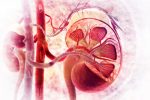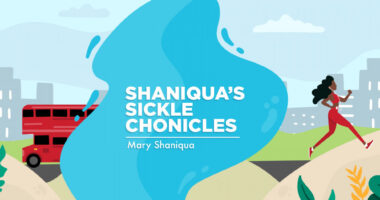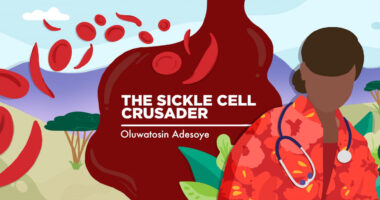RedMoon Project Hopes to Reduce Care Disparities for Black Community
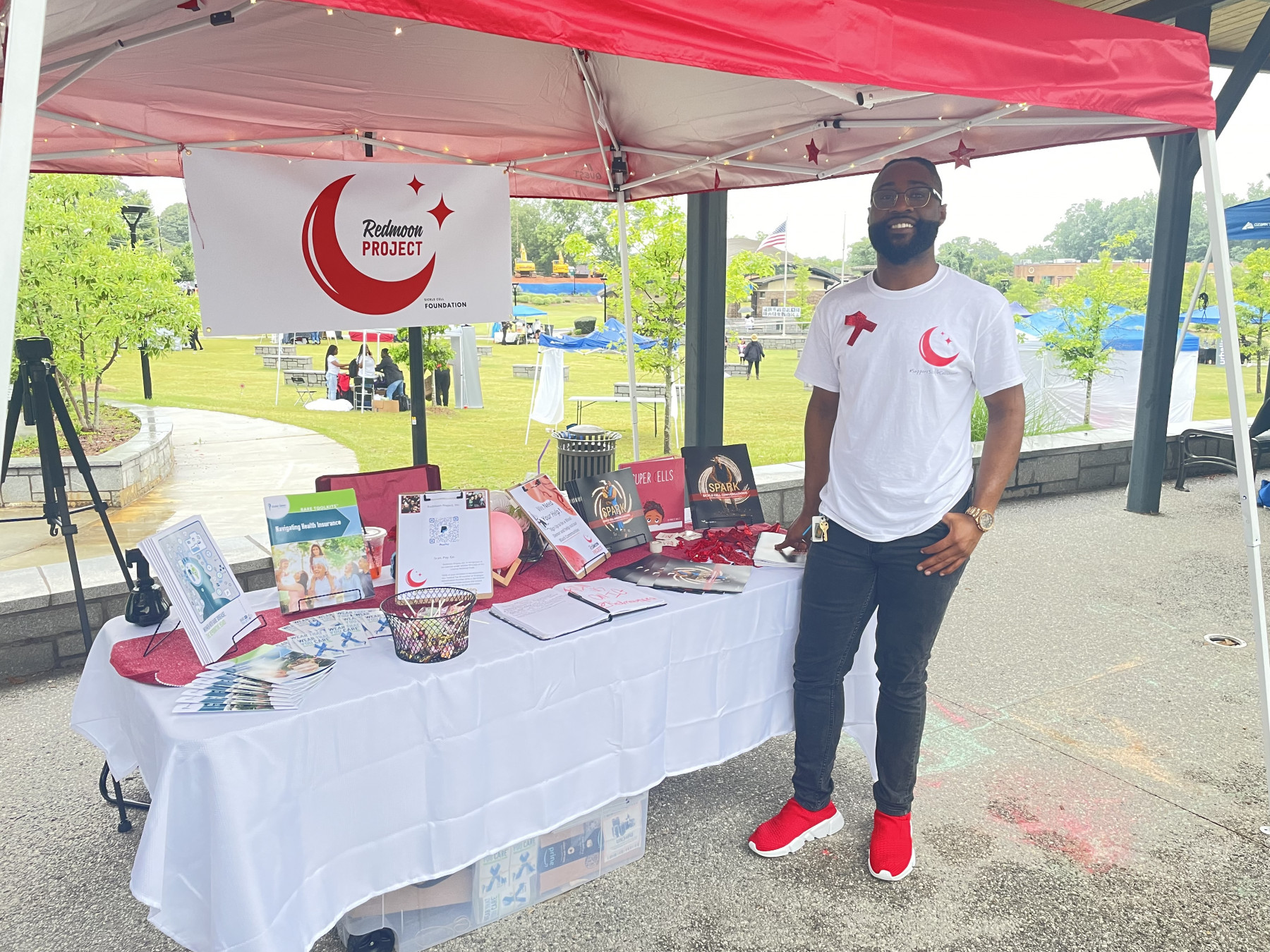
Cory Lewis promotes the RedMoon Project at a booth during a community park event. (Photos courtesy of Cory Lewis)
Prompted by the disparities in care between children and adults with sickle cell disease (SCD) and inspired to raise awareness about rare diseases, Cory Lewis has made it his personal mission to improve health for the African-American sickle cell community.
Lewis, who is a 27-year-old leasing agent and has SCD, started the Atlanta-based nonprofit RedMoon Project in June 2019. The name of the organization is derived from the acronym RED, meaning “restore” SCD patient care, “elevate” quality of life, and “develop” better resources and trust of the health system among young African Americans with SCD.
Along with five volunteers, Lewis is bringing awareness to the lack of quality care in SCD and educating the community on how to live well with the disease.
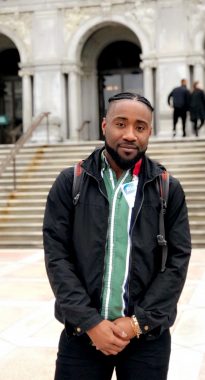
Cory Lewis, in front of the Library of Congress, travelled to Washington, D.C., to advocate on behalf of the Georgia rare disease community.
In an interview with Sickle Cell Disease News, Lewis said that when he was a child with the disease, everything was taken care of. However, when he aged out of the pediatric system, things changed — and not for the better.
“It’s a different world, when you turn into an adult, and now you’re taking the medical insurance and you’re the one who has to be on top of your medication management,” Lewis said. “It’s not as easy when you are being so catered to as a child and now you’re just thrown out there on your own.”
Combine that fact with Lewis’s experience going back to college for a bachelor’s degree in biology and learning about the lack of attention given to the more than 7,000 rare diseases, including his own, and RedMoon Project was born.
To restore and better develop care for the SCD community, especially in the Atlanta area, Lewis joined the Rare Disease Legislative Advocates (RDLA) two years ago. The organization Sick Cells, where he had been interning at the time, encouraged him to apply for a stipend and trip to Washington D.C., to advocate on behalf of the Georgia rare disease community.
As part of his work with RDLA following the trip, Lewis hosted a policy roundtable with Biotechnology Innovation Organization, a biotech trade association. It was an opportunity to learn from big pharmaceutical companies, including Vertex and Pfizer, about technologies such as CRISPR Cas-9 and push his message of restoring healthcare to the African-American SCD community.
After a year of running similar roundtables for RDLA, Lewis became a patient coordinator for the group in Georgia, where he is responsible for helping other organizations and individuals advocate for their own rare disease communities and running meetings for the 20 other patient coordinators in the state. Lewis still serves that role and coordinates requests to Georgia’s Senate and House of Representatives, such as appropriating funds to rare disease research, pushing newborn screening, and improving medication affordability.
Lewis has also attended the Georgia Department of Community Health’s Drug Utilization Review Board meetings, with the goal of bringing the patient voice to the table. The board is composed of physicians, pharmacists, academic members, and a consumer advocate, and meetings discuss data and safety of outpatient prescribed drugs, according to its website.
Patients do not typically comment, Lewis said, because the process of applying and filling out forms for a 30-second speech to board members is complicated. However, in the last February meeting, he had a chance to comment and voice his concerns, particularly after, according to Lewis, a doctor of that group said SCD patients can’t distinguish between physical pain and pain as a result of mental health issues.
“I feel like a lot of times these review boards are just being passed, but no patient voice has been heard because it’s so complex,” Lewis said. “We need to start having more people in there. Showing my face around to a lot of these legislative conferences … this is something that I want to push myself toward.”
Also on the public policy side of things, Lewis is volunteering for We Work For Health, a coalition of biotech, nonprofit, and academic representatives that seeks to inform elected leaders and the public about job creation and the development of new treatments in the pharmaceutical industry.
In that role, Lewis is currently connecting with Georgia senators so that the state allocates more money toward rare disease programs. He’s also pushing members of the U.S. Congress representing Georgia to pass the Elijah E. Cummings Lower Drug Costs Now Act, which would lower the cost of prescriptions.
RedMoon Project also is working on an annual physicians conference that updates the Black SCD community on treatments and helps doctors understand the disease at a deeper level, Lewis said.
Beyond restoring and developing care for the SCD community in Georgia, Lewis was part of Bluebird Bio’s Be The Spark initiative, which allows anyone with or affected by SCD to sign up to be a “spark,” and amplify their own personal story so that the public and biotech company can better understand the patient perspective. The company flew Lewis to California to ask him about his experience living with SCD for a video promoting the project.
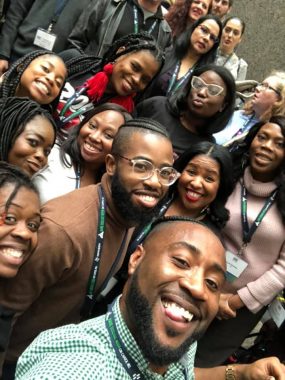
Cory Lewis takes a selfie with advocates during Rare Disease Week through Rare Disease Legislative Advocates.
“Spark for change on sickle cell disease is really a big question: Are you that person who has sickle cell but you just believe that you can do anything you want? There’s nothing that stops you,’” Lewis said. “Those are the types of things that we kind of want to push out there in society.”
RedMoon Project also is engaging and networking with other nonprofits in Georgia and the broader Black community to collaborate on improving quality of life. That includes Lewis representing his nonprofit at a patient advocacy summit hosted by Georgia Bio, a membership-based organization promoting the interests of the state’s life sciences industry, and pushing legislation through RX in Reach, a coalition that seeks to end the financial barriers to securing medication and treatment in Georgia.
Lewis is engaging on the hyper-local level in his own Clayton County, where 72.8% of the population is Black. The county is part of the Atlanta metropolitan area and home to the international airport. Lewis is trying to get the word out at local community park events and hospitals about the RedMoon Project and his mission to improve health among young African Americans with SCD.
“Getting those libraries, those schools, the universities, hospitals, any recreation event or center, we have to push out sickle cell, whether it is just an emblem or logo of RedMoon Project, and it could just have a QR code,” Lewis said. “Something so small, and that minor can really make a big change.”
He’s hoping to prevent an experience he had at a local hospital where a doctor did not treat his SCD crisis because he did not believe Lewis had the disease.
Lewis’s public policy advocacy work, running a nonprofit, working full time, and managing his SCD are all inspired by a future where a cure could be available for all people. Most treatments available address symptoms associated with SCD, such as pain crises, but not the underlying cause.
“I always tell myself, at least I try. If I have to die and I still don’t get a universal cure, I want to make sure I go in and make that happen for other sickle cell patients,” he said.




